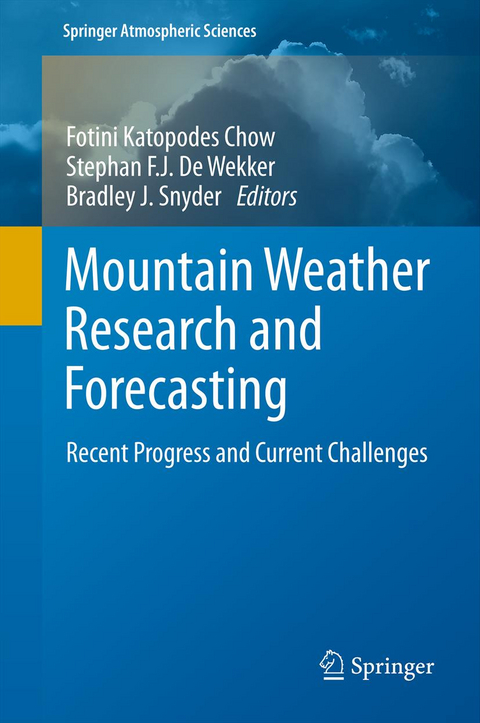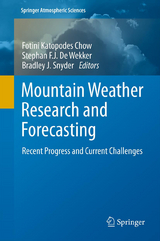Mountain Weather Research and Forecasting
Springer (Verlag)
978-94-007-4097-6 (ISBN)
The book begins with an overview of mountain weather and forecasting chal- lenges specific to complex terrain, followed by chapters that focus on diurnal mountain/valley flows that develop under calm conditions and dynamically-driven winds under strong forcing. The focus then shifts to other phenomena specific to mountain regions: Alpine foehn, boundary layer and air quality issues, orographic precipitation processes, and microphysics parameterizations. Having covered the major physical processes, the book shifts to observation and modelling techniques used in mountain regions, including model configuration and parameterizations such as turbulence, and model applications in operational forecasting. The book concludes with a discussion of the current state of research and forecasting in complex terrain, including a vision of how to bridge the gap in the future.
Fotini (Tina) Katopodes Chow is an associate professor in Civil and Environmental Engineering at the University of California, Berkeley. Her current research interests are in performing large-eddy simulations of atmospheric boundary layer flows, with a focus on flow over complex terrain and development and testing of new turbulence models and boundary conditions. She and her students have worked on applications to mountain meteorology, urban dispersion, wind energy, and land-atmosphere coupling, among others. She received an NSF CAREER award in 2007 and the Presidential Early Career Award for Scientists and Engineers (PECASE) in 2011. Stephan F. J. De Wekker is an associate professor in Environmental Sciences at the University of Virginia. His research focuses on the investigation of atmospheric boundary layer processes over complex terrain using a combination of field studies, data analysis, and numerical modeling techniques. He seeks to apply hisexpertise to problems in a multi-disciplinary context such as found at the interface with ecology, air quality, and hydrology. He received an NSF CAREER award in 2012. Bradley J. Snyder is currently Head of Science Transfer and Training at the Pacific Storm Prediction Centre in Vancouver, British Columbia. He is responsible for coordinating forecaster training and acts as liaison between operations and research groups. His focus is on mountain and marine meteorology. He worked as an operational forecaster for 15 years at various locations across Canada and has undertaken research in radar, lightning, and air quality meteorology. He has also been involved in field studies, including forecasting during the Mesoscale Alpine Programme.
Mountain Weather Prediction: Phenomenological Challenges and Forecast Methodology.- Diurnal Mountain Wind Systems.-
Dynamically-driven Winds.- Understanding and Forecasting Alpine Foehn.-
Boundary Layers and Air Quality in Mountainous Terrain.- Recent Progress on the Theory, Observations, and Predictions of Orographic Precipitation.- Microphysical Processes Within Winter Orographic Cloud and Precipitation Systems.- Observational Techniques: Sampling the Mountain Atmosphere.- Mescoscale Modeling Over Complex Terrain: Numerical and Predictability Perspectives.- Meso- and Fine-scale Numerical Modeling Over Complex Terrain: Parameterizations and Applications.- Numerical Weather Prediction and Weather Forecasting in Complex Terrain.- Bridging the Gap Between Operations and Research To Improve Weather Prediction in Mountainous Regions.
| Reihe/Serie | Springer Atmospheric Sciences |
|---|---|
| Zusatzinfo | XIII, 750 p. |
| Verlagsort | Dordrecht |
| Sprache | englisch |
| Maße | 155 x 235 mm |
| Themenwelt | Naturwissenschaften ► Geowissenschaften ► Geologie |
| Naturwissenschaften ► Geowissenschaften ► Meteorologie / Klimatologie | |
| Technik ► Umwelttechnik / Biotechnologie | |
| ISBN-10 | 94-007-4097-2 / 9400740972 |
| ISBN-13 | 978-94-007-4097-6 / 9789400740976 |
| Zustand | Neuware |
| Informationen gemäß Produktsicherheitsverordnung (GPSR) | |
| Haben Sie eine Frage zum Produkt? |
aus dem Bereich




